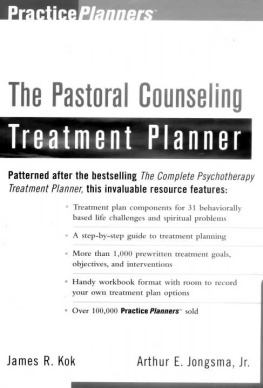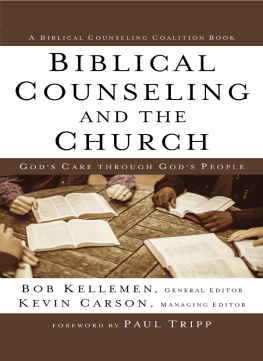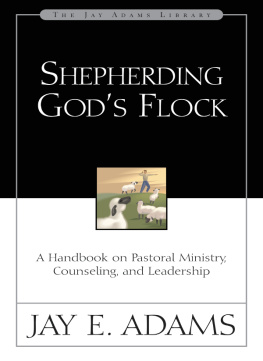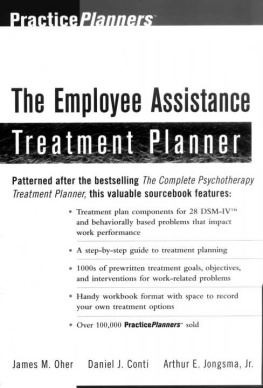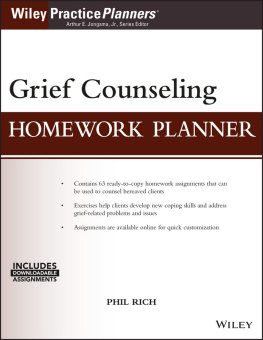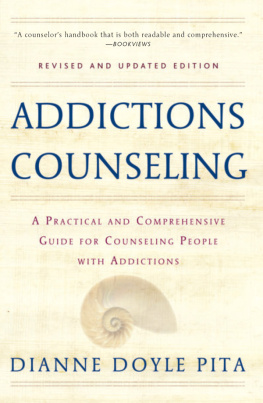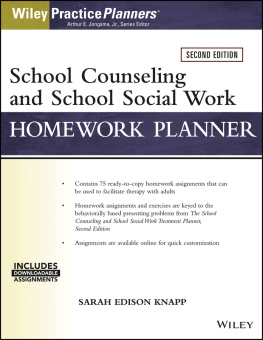James R. Kok
Arthur E. Jongsma, Jr.





To the ministers, priests, rabbis, and pastors, God's front-line counselors. And to one who stands out-The Reverend Gareth S. Kok, my father. Neighbors once remarked, `If there isn't a car parked in front of the parsonage, we wonder what's wrong, "-a testimony to the steady stream of counselees in a pastor's life.
James R. Kok
CONTENTS
PREFACE
When Art Jongsma described a counseling planner designed to help pastors, priests, and rabbis, I was hooked. These frontline men and women of ministry hold a prime position of honor and respect in my roster of valued human beings. The prospect of aiding them in their daily challenges excited me. To me these pastoral people represent the best of God's good people. Week in and week out, people dealing with a smorgasbord of trials, conflicts, and dysfunctions show up on their doorsteps asking for help. And those people are always welcomed in. Weeping, perplexed, in despair, angry, injured, and ill, they come to the church, cathedral, synagogue, or temple expecting to meet God's servants, and they do.
This book is a tool to assist in bringing additional order, understanding, and systematic process into these godly encounters between beleaguered people and the highly dedicated women and men who drop everything to listen, suggest, inquire, pray, and lead to the places and resources needed.
There has never been a book like this before. In my thirty-five years of pastoral ministry, no one thought of such a simple, clear, and effective way to guide religious leaders on the often opaque journey called counseling. Certainly more books like this will follow. We have discovered effective paths out of the subjective morass of trying to help hurting people. We now know these paths can be written down and shared for the benefit of all.
Arthur Jongsma is a pioneer. His first book, The Complete Psychotherapy Treatment Planner, should go down in history as having changed the way therapists and counselors lay their plans and manage their caregiving. And now, I predict this Pastoral Counseling Planner, a logical extension of the Planner Series, will stand as the beginning of a more effective era of providing the frontline professionals, the rabbis, pastors, and priests of our world, with tools and resources for their crucial role as gatekeepers and the initial embracers of the troubled folk of humanity.
I am deeply grateful to Arthur E. Jongsma for including me in this groundbreaking project. He exhibited world-class patience with my technological impairment as we worked together 2000 miles apart, sharing electronic documents over the Internet. I provided a lot of ideas. Art shaped, filled, polished, and crafted the product into a useful document.
For nine months of my life I focused very narrowly on this project while engaged fully in care ministry at the Crystal Cathedral in Garden Grove, California. Something had to be put on hold for the time beinggolfing, gardening, recreational reading, my aged parents (Gareth and Ada Kok, well into their nineties) living nearby, and mostly my usual laid-back attitude, which Linda, my wife, prefers. But, if the value is high, one can stay with anything when it is of obvious importance, and pay the price for the time being. I dedicate this book to the pastors, rabbis, and priests of the parishes, congregations, and spiritual communities of the world. They are in the trenches, on the front lines, meeting the needs of humanity with love and humility and drying the tears of their people. They deserve credit.
Pastor James R. Kok
Director of Care Ministries
The Crystal Cathedral
Garden Grove, CA
INTRODUCTION
Troubled people often turn first to their spiritual advisors for counseling. In fact, research has shown that nearly fifty percent of the population, whether Catholic, Protestant, or Jewish, asked for help from their religious leaders before anyone else. And, increasingly, even secular counselors are integrating spirituality into their psychotherapeutic practices.
This handbook is designed to assist religious leaders, pastoral counselors, and psychotherapists in aiding spiritually oriented people who are seeking guidance for emotional, relational, social, or religious struggles. The unique step-by-step design of this treatment planner will enhance the confidence of anyone called on as the first line of defense in helping those who are facing life's knottiest dilemmas.
Therapeutic counseling requires more time and training than the clergyperson usually can invest. But, with more congregants turning to them every day, pastors, priests, and rabbis must nevertheless perform as counselors whether they want to or not. This book is intended to provide those spiritual leaders with some clinically proven directions for counseling. It will also give secular therapists new insight into the beliefs of and the goals and resources available to their spiritually inclined clients. Today, enlightened therapists look closely at the spiritual beliefs and practices of their clients and profit heavily by helping their clients draw on the spiritual resources they embrace. A knowledgeable counselor who does not identify with the faith of his/her client could still wisely include the rituals, writings, and religious community to the benefit of the one struggling.
The perspectives from which the spiritual resources are drawn are Judeo-Christian and should be helpful for anyone from the major religious groups that draw on the writings and experiences of the Torah, The Bible, and the New Testament. The word God is used throughout, but the contents of the Planner can be easily adapted to embrace any higher power. Additionally, the individual chapters can be used effectively by anyone, regardless of their faith-even by those who simply want to follow the outline for approaching difficult problems but wish to ignore the specific religious references. The strongest efficacy for this tool, however, will be found in the complete and conscientious inclusion of the suggestions made within a religious context. The secular counselor will carefully solicit a religious history from helpees and then sensitively enlist their cooperation and agreement in leaning for support on the spiritual resources familiar to them and loved by them.
This sourcebook attempts to address not just psychological and emotional problems (which, depending on degree of complexity, clergy may well wish to refer to a professional therapist), but also life stage issues and decisions as well as challenges to faith. Naturally we have not been able to include all the issues a pastoral counselor or spiritually oriented psychotherapist faces. But, following the suggestions for assessing and clarifying the various perplexities of a constituent's problem set, the counselor should be able to handle almost any quandary.

